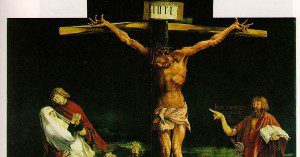This morning’s gospel lesson makes it impossible for me not to relish—just a little bit—the poking in the eye of those who don’t want to take the Bible “literally.” The Dishonest Steward is one of my favorite parables in the New Testament. For one, it’s hard and needs some reasoning out. And two, if you’ve decided that the Bible shouldn’t be read the way you would try to read any book—by trying to understand what it says—you will end up making conclusions entirely at variance with all the other things the Bible says. If you don’t want to read the bible “literally” you end up with an incoherent and confused God who isn’t able to say what he means, who is humorless and, well, illiterate, like so much of the world.
Of course, what I mean by reading the bible “literally” is that you take the text as it is, with its rich tapestry of metaphor, illusion, humor, irony, sarcasm, and emotion. It isn’t a manual, a textbook, or even a “letter from God to me.” It doesn’t go in a straight line. You have to agree to it on its own terms or you will never see its astonishing beauty.
What others mean by “literally” is that the text is read (they would say wrongly, and actually, I would too) in a flat, wooden, uncomprehending way. If the line reads that God “owns the cattle on a thousand hills,” well, then he owns exactly the cattle on one thousand hills and nary a bovine more. It couldn’t possibly be that God likes poetry, and likes people who like poetry, and that “owning the cattle on a thousand hills” is a beautiful way of saying that God is richly provident and has both enough cattle and enough of everything.
No, the charge that people like me read the bible “literally” is specious. I would say that I read it correctly (no scare quotes so help me), as if it is true, and beautiful, and by parts strange. If you go into it thinking it isn’t true and isn’t beautiful, you end up with a narrow and tiny God, you put him place of the dishonest manager, this morning, instead of putting yourself there first.
And of course, I can see why you recoil from doing so. What a humiliating and grasping place to be. And how unpleasant to go from the beauty and light of the pasture, the found coin, the feast celebrating the lost son who was found, to this middle-aged (I mean, he must be), washed up, bent swindler who discovers that all his sins are finding him out.
He has lit his lamp, like the woman before taking up her broom, but his work means he won’t stir from his chair for the whole night. Pouring over the books, he searches also—not for a lost coin—but for a way out. He has hemmed himself in, he has heaped up his own ruin. Observe his calculations. “I am not strong enough to dig, and I am ashamed to beg.”
Surely, I have ever been in this place when it comes to the question of money. I want it. I want it to be filled up in sacks around me so that I don’t have to worry about where it is coming from. I want not to scrape and grasp, to be anxious and tired. I don’t want to go to work at the Christmas Tree Shop as I once did, straightening the absurd objets that make the American economy go round and round, trying to pray for the woman buying an accumulation of wretched little Styrofoam half-priced snowmen with plastic spectacles glued on their beady little eyes, on Christmas Eve, rather than hating her. I should have said “snowpeople,” for I wasn’t allowed to wish her a “Merry Christmas” even though that was clearly her holiday of choice. It was myself I hated, though, for getting into debt and having to work a job I hated as much, or more, than myself.
I don’t want to go back to fire watch, to walking up and down in a darkened lumber mill looking for smoldering flames amongst piles and piles of sawdust. I don’t want to do pet care, or enter little bits of irrelevant units of information into a computer. I don’t want to do any of those jobs.
Nor do I want to face the debt of my own faltering and sinful existence—the shame of my neglect in paying what honor and attention to others that I owe, the weakness of constantly giving in to my own grasping nature. I am the dishonest manager by virtue of getting up in the morning and walking through the day, heaping up sins, even when I’m not trying, like so many bags of ruin around me. What am I to do?
The dishonest manager decides what to do. He calls his master’s debtors one by one and slashes their debt. He “makes friends for himself” among those who have similarly mishandled their professional and private lives, who frankly, have exactly the same relationship to his master that he does—debt, ruin. They go away happy, good feelings flowing all around.
The master—and Jesus—commend the manager. If only you all could be as shrewd as he was, complains Jesus.
The modern reader searches back over the words and wonders if Jesus is commending dishonest dealings with money, as if anywhere else in the scripture one is permitted to lie, to cheat, to steal. Did all the rules suddenly change? Is my dishonest nature no longer a problem? To which Jesus again shakes his head and mutters, ‘Don’t they teach any reading comprehension in the schools these days? I wonder if any of them can even name one book—just one—they’ve read in the last year.’
No, that is not the point of this dark and terrible story. Look back up at the other stories Jesus told in chapter 15. What unites them all? The stooping woman, the shepherd and his lost sheep, the father and the son?
Hemmed in by shame and weakness, the steward takes his life in his hands and does whatever it takes to be ok in the next phase of his faltering life. Which is to say, as Jesus goes on looking over the crowds of disciples and Pharisees, the latter of which, we find out a few verses before, “were lovers of money” and therefore “ridiculed him,” that most of us are not desperate or anxious enough about the sickening mounting debt allotted to our eternal accounts. We have what we need now, and so we don’t think at all about how our mismanagement of what we have—morally, spiritually, eternally—means that we will have nothing later. Our senseless and selfish human natures ensure that we will all, each of us, “lose our management” and be cast out of the master’s house.
You won’t even think in economic terms, castigates Jesus. You won’t think at all. You imagine that you are good and that you’re all paid up, but it’s just because you haven’t opened the door of the storehouse—never mind your own mind and heart—and seen that you squandered it all and there’s nothing there.
Christians like to warn against using the specter of hell in the declaration of the gospel. It’s not very nice, for one thing, and fear isn’t a good motivator—nor shame for that matter. We should all come to Jesus out of love and desire for him, not to rescue our souls from torment. That’s paltry, grasping, and, well, dare I say, desperate.
But desperation clears the mind, illuminates the will, puts everything into focus. How often does God particularly use the experience of utter, grasping, terrifying desperation to reveal the truth that man is devoted to destruction as the sparks fly upward? That we are perishing forever and need to be rescued? The Exodus is the foundational one, of course, but so are all the others ever after—Abraham, Jacob, Hannah, Elijah, Jonah, literally all the prophets. You think you own the cattle on a thousand hills, that you are fine and everything is fine, and then you look up one day and find that they aren’t cattle, they are bags and bags of eternal offense delivered up to a God whom you do not know and do not love. What are you to do?
Make Friends With That God. Fling yourself on his mercy. Spend every kind of penny you have to make him forgive you. Throw all your money—and yourself—at him and beg him not to cast you out.
It seems paltry, greedy, needy, grasping, the kind of motivation we would yet despise. Until you find yourself some other day, loafing around the streets of Jerusalem, trying to figure out how to make a buck, and see another kind of steward go by. This one is the perfect manager, the one who takes what is given to him and administers it with true, deep-hearted obedience. Whatever was given to him for safe-keeping, he gave it all back without losing a single measure, pressed down, shaken together. Yet this other steward is bleeding, beaten, cast out, driven out of the city to be hung up on a tree and then to die. And in so dying, to, by the power of his life, by the glory of the shame with which he clothes himself—your shame—to pay off all that debt, every single bit of it.
What, is begging too impossible for you? Do you prefer the quiet shame and weakness of your ruinous pride? Do your moral, intellectual, and emotional weaknesses taste better than groveling desperation? Can you not stomach to look up and see a man—a steward—who bears in his body the shame of your cursed debt? Would you rather die than live?
Wouldn’t you rather be brought into the house, to be forgiven all those offenses you could never pay for, never atone for no matter what you did?
Jesus lets the parable fall like the lead balloon that it is and draws away the twelve, for the third time, to declare his intention to die. Luke reports that “they understood none of these things,” because how could they? They don’t know their right hands from their left hands. They are busy buying Styrofoam Santas and judging each other. They won’t get it until much later, wandering around death’s empty storehouse, laughing from relief and joy.












